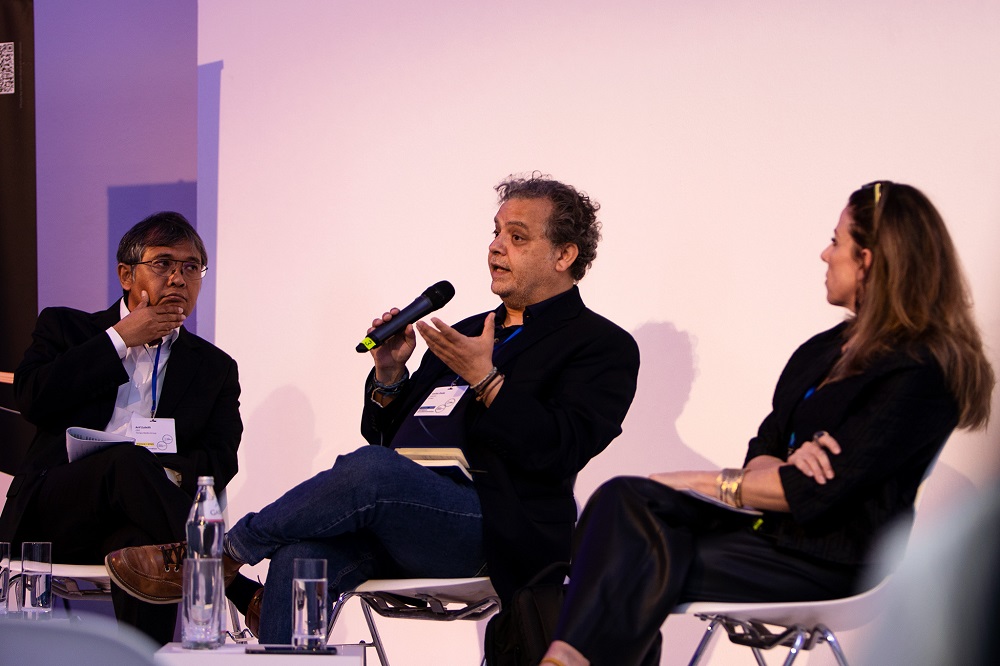Surrounded by images of journalists killed for their work, Carlos Dada, the director of El Faro in El Salvador, remarked on the need for journalists to continue pushing back against authoritarian, anti-free press policies, even in the face of harassment, threats, and other risks to press freedom worldwide.
“The ones who are here work under harsh conditions, that’s true, but in a way we are lucky. There’s hundreds of our colleagues that have been deliberately assassinated in the last years”, he said during the May 25 panel, titled “Global Spotlight: Press Freedom at Risk”, which was part of the 2023 IPI World Congress.
Dada and fellow panelist Arif Zulkifli, the CEO of Tempo Media Group in Indonesia, have faced attacks from their respective governments. For Dada, this has included judicial harassment, threats, and Pegasus surveillance. The continuing pressure recently led El Faro to move its operational headquarters to Costa Rica. In Indonesia, the free press is under pressure from restrictive new laws such as the Indonesian Electronic Information and Transactions (EIT) law, which criminalizes the publication of information “tarnishing” the reputation of the government.
The panel explored how to move forward when press freedom is at risk, through shared experiences between Dada and Zulkifli. Moderator Daniela Pinheiro, a Brazilian journalist and former editor of the weekly magazine Epoca, opened by telling the crowd that threats to press freedom are “no longer only a risk, it’s a fact”.
The situations in both Indonesia and El Salvador show that, in some ways, the government is succeeding in limiting free press. Zulkifli explained that, in Indonesia, most media – and especially television media – are owned by political parties and business tycoons. “So we cannot rely on them in terms of how to [provide] neutral and independent information because it belongs to someone who has interest in Indonesian politics”, he told the audience.
WATCH THE RECORDING HERE
Jokowi, the colloquial name for Indonesian president Joko Widodo, indicated when he took office in 2014 that he would protect the rights of journalists under the Press Law, passed in 1998. These protections, however, have been rolled back over time; the EIT law, for example, allows journalists to be arrested and detained under its provisions.
The popularity of Salvadoran president Nayib Bukele poses a challenge to the media there, not because he has swayed journalists, but because he has swayed the public. Dada explained to Congress participants that Bukele, given his 85 percent approval rating, is effective in convincing most Salvadorans that investigations by El Faro and other independent media are fake, reducing their effectiveness.
Despite this, Dada remained confident of the power of the press, telling the audience, “I do believe that we would be worse without [journalism].”
“With President Bukele, we have an autocratic leader and are one step away from becoming a dictatorship”, says @carlosdada, whose media outlet was forced to relocate to Costa Rica due to severe pressure from authorities, including press freedom crackdown & Pegasus surveillance. pic.twitter.com/yiuNcyl43J
— IPI – The Global Network for Independent Media (@globalfreemedia) May 25, 2023
He also highlighted the importance of maintaining editorial standards, even in the face of increasingly authoritarian governments. “This will also end”, he added as a message of hope for the long-term future, and as a reassurance that continuing to create high-quality journalism will be worthwhile.
Revisit the IPI World Congress & Media Innovation Festival 2023